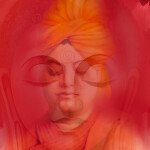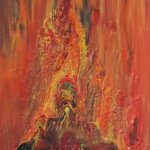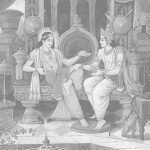“O lord, I feel like laughing when sages and philosophers speak of Maya with some awe. There must be some truth in their fear, but Maya surely cannot put everybody under its spell!” One day Narada observed while walking with Vishnu on one of their occasional visits to Earth. Needless to say, they looked like ordinary mortals.
“I’m too thirsty to answer,” was Vishnu’s brief comment. He sat down under a tree as if terribly tired and looked wistfully at the river flowing beyond a stretch of bushy meadow.
“Wait a moment and I’ll fetch water for you,” said Narada. He walked briskly towards the river. Plucking a few leaves and thorns, he improvised a cup, entered the river and stood knee-deep in the water. It was indeed refreshingly cool. He leaned forward to fill the cup.
“O weary traveler!” the voice, extremely inviting, surprised Narada. He straightened up and looked at the shore. There stood a beautiful maiden, with a water-filled jar under her arm. “The water there is rather muddy, unfit for drinking. If you care to follow me to my house yonder, I will serve you with clean water,” said the maiden, smiling bashfully.
She turned and started to walk. Narada followed her.
“You can throw away the leaf-cup. We have our tumblers!” the maiden said softly, looking over her shoulder and displaying yet another flash of bewitching smile.
Her parents received Narada with sincere affection and served him a sumptuous lunch and offered a cozy bed for his rest. Narada lay down for a siesta, but soon passed into a slumber. It was evening by the time he woke up.
“My son, you still look tired, even though you are relaxed. Besides, it is not safe to travel after dusk. Better pass your night here,” proposed the maiden’s father. Behind him stood the maiden, reinforcing her father’s proposal with a meaningful smile.
Narada was only too happy to agree. At night it was the maiden who served him his dinner and who prepared his bed. Narada was overwhelmed.
“My boy,” in the morning the maiden’s father told him, “I’ve only one child— my daughter. Providence has given me enough. Would you mind marrying my daughter and inheriting my property?”
Narada blushed and made no protest. The proposed marriage was duly performed and slowly Narada took over the entire responsibility of his father-in-law’s property and establishments. His parents-in-law died in due course. Narada was blessed with children. They grew up, got married and promoted Narada to the position of a grandfather. His days passed through pleasures, sorrows and hopes as normal in the life of everybody else.
Once in a while, however, he was beset with melancholy. He felt as if he had forgotten something vital. But before he had the time to concentrate and find out what that was, his attention was diverted to some mundane problem.
One day it began to rain incessantly. At midnight Narada woke up with a jolt. The river was in spate and the embankment had broken, flooding the whole village. In no time parts of his house began to collapse.
“Where are you, my husband!” cried out his wife. As Narada plodded through the water and mud in the direction of the voice, his grandchildren’s cries were heard: “We are being swept away by the tide, Grand-pa.” He could also hear the shouts of his sons and daughters. The bewildered Narada groped in the darkness, his heart breaking at his inability to come to anybody’s rescue. In the flashes of lighting he had flitting glimpses of his dear ones being carried away by the currents.
“O God!” cried out Narada. That woke him up. In fact, he had dozed off for a second while bending to fill the leaf-cup with water. He returned to Lord Vishnu with the water, but blushing almost to death.
“Narada! Did you by any chance take a little more time than a moment?” Vishnu asked while receiving the water. “I understand, my Lord, Maya is that which keeps the souls away from you.…”
“While I wait!” added Vishnu.
Maya is popularly understood as a synonym of illusion. But the term has far greater significance at the spiritual plane. It is the creative power and its role in our life changes as our consciousness grows. “All manifestation proceeds by the two terms, Vidya and Avidya, the consciousness of unity and the consciousness of multiplicity. They are the two aspects of Maya, the formative self-conception of the eternal,” says Sri Aurobindo. The story illustrates the spell of Maya operative in nature – a concept between the two aforesaid definitions of Maya. Even though man remains immersed in ignorance, the Lord never gives him up.
With deep gratitude to Manoj Das











